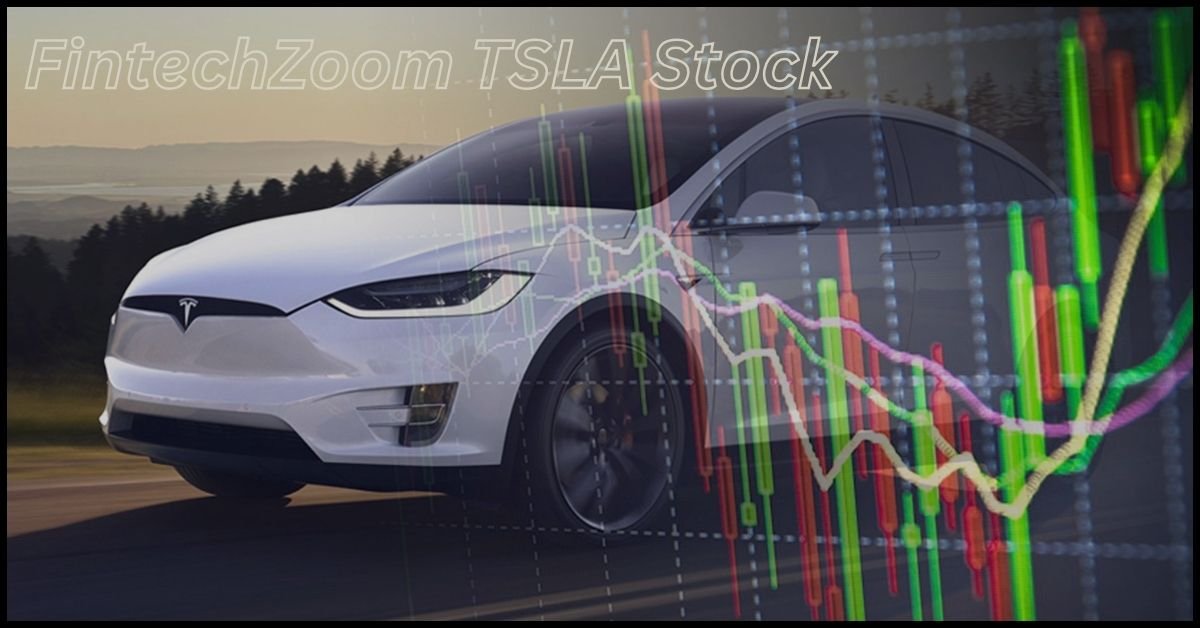FintechZoom TSLA Stock. (TSLA) has become one of the most watched and debated stocks in the global market, and its performance on platforms like FintechZoom draws significant interest. Known for its innovation in electric vehicles, renewable energy solutions, and cutting-edge technology, Tesla has disrupted multiple industries. This article will comprehensively analyze Tesla’s stock, covering its latest performance, market trends, expert insights, and future predictions.
Whether you’re an investor, market enthusiast, or tech follower, this guide will provide valuable perspectives on TSLA.
Overview of FintechZoom TSLA Stock
Tesla Inc. (NASDAQ: TSLA) has been a dominant player in the stock market since its initial public offering (IPO) in 2010. Tesla started at a modest price, but the stock has experienced significant growth over the years, transforming it into a high-value asset for investors. Tesla’s focus on innovation, sustainability, and electric vehicles (EV) has attracted the attention of individual investors and significant institutional funds. Currently, Tesla holds a position as one of the most valuable companies in the world.
As of 2024, FintechZoom TSLA Stock has demonstrated volatility, yet it remains an attractive option due to its potential for future growth in the EV industry and renewable energy markets. The demand for clean energy solutions and the world’s gradual shift away from fossil fuels greatly benefit Tesla’s long-term outlook.
Historical Performance of TSLA
Substantial highs and lows have marked Tesla’s stock journey. Since its IPO, Tesla has grown exponentially, especially after it started showing consistent profitability in 2020. One of the most notable moments in TSLA’s history was its stock split in August 2020, which made the stock more accessible to a broader range of investors.
Despite facing challenges like production delays and economic downturns, Tesla has maintained an upward trajectory in the long run. The company’s stock reached an all-time high in November 2021, driven by the increased demand for electric vehicles and improved financial health. However, periods of volatility, including downturns in the broader tech market, have occasionally impacted TSLA’s value.
Key Drivers Behind FintechZoom TSLA Stock Movement
Several factors influence Tesla’s stock movement. One of the primary drivers is the company’s ability to innovate and meet market demand. Tesla’s introduction of cutting-edge technology in EV batteries, self-driving cars, and energy storage solutions helps boost investor confidence.
Market trends such as the global push for clean energy, government subsidies for EVs, and a growing consciousness about environmental sustainability also play pivotal roles. Tesla’s ambitious production targets and international expansion have also added significant value to its stock.
Another primary driver is Elon Musk’s public presence. His social media posts, interviews, and announcements about Tesla’s plans have been known to cause sharp movements in the stock price, both positive and negative.
Tesla’s Financial Performance: Key Indicators
Tesla’s financial performance has improved dramatically over the last few years. The company reported consistent profitability starting in 2020, a significant milestone given its long history of losses in its early years. Key financial indicators such as revenue growth, net income, and free cash flow have shown strong performance.
Tesla posted impressive results for the fiscal year 2023, with record-high revenue and a healthy balance sheet. The company’s revenue growth was primarily driven by increased vehicle deliveries, expansion into new markets like India and Southeast Asia, and the continued scaling of its manufacturing plants. Tesla’s energy business, including solar panels and energy storage, also contributed positively to its financial health.
Impact of Global Economic Trends on TSLA
Global economic trends have a direct impact on Tesla’s stock performance. Inflationary pressures, rising interest rates, and supply chain disruptions have been critical concerns for Tesla investors. Like other tech and automotive companies, Tesla faced challenges due to semiconductor shortages and rising material costs.
However, Tesla’s vertical integration strategy—where it controls much of its production process—helped it navigate these challenges better than many competitors. Tesla’s decision to produce its batteries and work closely with suppliers has positioned the company well in the current economic climate.
Moreover, geopolitical factors, including trade tensions and the ongoing shift towards renewable energy policies across Europe and North America, have significant implications for Tesla’s stock movement.
Elon Musk’s Influence on Tesla’s Stock
Elon Musk, Tesla’s CEO, plays a crucial role in the company’s stock performance. His visionary leadership and ability to generate hype around Tesla have made him a central figure in the company’s success. However, Musk’s frequent use of social media, particularly Twitter (now rebranded as X), has caused Tesla stock price volatility.
Musk’s public comments on cryptocurrency, market conditions, and even his involvement with other ventures like SpaceX and Neuralink often influence TSLA’s market sentiment. Investors closely monitor his actions, statements, and interviews to gauge future movements of the stock.
Tesla’s Expansion and Innovation
Tesla’s rapid expansion and continuous innovation are significant reasons behind its stock growth. The company has set up gigafactories across the globe, including in the United States, China, and Germany. These gigafactories enable Tesla to meet growing demand by scaling production quickly.
Tesla is also a leader in autonomous driving technology. Its Full Self-Driving (FSD) software has the potential to revolutionize the automotive industry, and successful implementation could significantly boost Tesla’s stock. Another critical innovation investors are keenly following is developing its battery technology to increase energy density and reduce costs.
Challenges and Risks for Tesla’s Stock
While Tesla is a market leader, it faces various challenges and risks. These include rising competition in the EV market, potential regulatory hurdles, and the high costs associated with scaling production. Rivals like Rivian and Lucid Motors and legacy automakers such as Ford and General Motors are increasingly investing in electric vehicles, which could impact Tesla’s market share.
Regulatory challenges, primarily related to safety issues with Tesla’s self-driving technology, pose another risk. Additionally, production delays and supply chain issues, mainly associated with battery production, could affect Tesla’s stock in the future.
Tesla’s Competitive Landscape
The market for electric vehicles is becoming more competitive. Established car manufacturers like BMW, Volkswagen, and General Motors are making significant inroads into the EV market. Companies like Rivian and Lucid Motors also aim to challenge Tesla’s dominance, particularly in the luxury EV segment.
In the broader tech and clean energy market, Tesla faces competition from companies like Google and Amazon, which are developing autonomous driving and energy storage technologies. Despite these challenges, Tesla’s first-mover advantage and strong brand loyalty continue to give it a competitive edge.
TSLA Stock Forecast: What Analysts Are Saying
Financial analysts remain divided on the future of Tesla’s stock. Some analysts predict that Tesla’s stock will continue to rise as the global shift towards EVs accelerates and as Tesla continues to innovate. Bullish analysts point to Tesla’s leadership in the EV market, growing revenues, and potential to expand into new industries like autonomous driving and energy storage.
On the other hand, more cautious analysts highlight the risks of high valuation and increasing competition. They also emphasize potential issues like production challenges, regulatory scrutiny, and market volatility as factors that could limit TSLA’s stock growth.
Frequently Asked Questions (FAQs)
Why is Tesla’s stock so volatile?
Tesla’s stock is volatile due to investor sentiment, market speculation, global economic conditions, and the influence of CEO Elon Musk. As a tech company, it also faces rapid changes in its industry, contributing to price fluctuations.
Is Tesla an excellent long-term investment?
Many investors believe Tesla is an excellent long-term investment due to its leadership in the EV market and continuous innovation. However, considering the risks, including rising competition and economic factors, is essential.
What are the most significant risks facing Tesla’s stock?
The most significant risks include increased competition in the EV market, regulatory challenges, production delays, and the potential for market saturation as other companies ramp up their EV production.
How does Tesla compare to other EV stocks?
Tesla remains the dominant player in the EV market, but competition from companies like Rivian, Lucid Motors, and traditional automakers has increased. Tesla’s global reach, brand strength, and innovation give it an advantage over most competitors.
How does Elon Musk’s leadership impact Tesla’s stock?
Tesla’s stock is significantly impacted by Elon Musk’s leadership. His vision drives the company’s innovation, but his public statements can cause stock price volatility, which can be both a benefit and a risk.
How has Tesla’s financial performance affected its stock price?
Tesla’s financial performance, notably its transition to consistent profitability, has been a significant driver of its stock price increase. Strong revenue growth, vehicle deliveries, and expanding market presence contributed to investor confidence.
Conclusion
Tesla’s stock remains a focal point for investors, with its history of rapid growth, innovation, and leadership in the electric vehicle market. While risks such as competition and regulatory challenges exist, Tesla’s long-term potential in the clean energy sector and technological advancements make it a stock to watch. Investors should weigh both the opportunities and risks before making decisions regarding TSLA.





